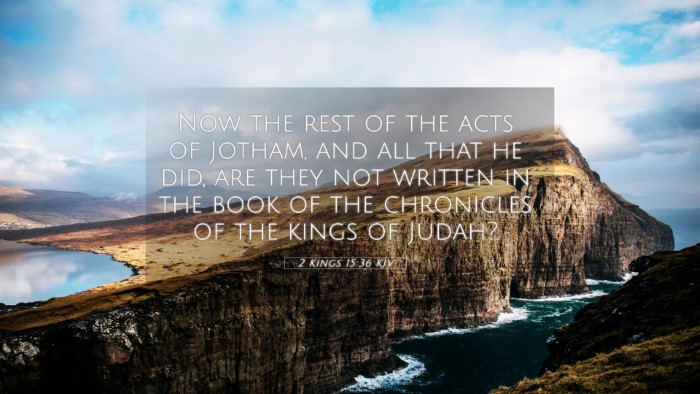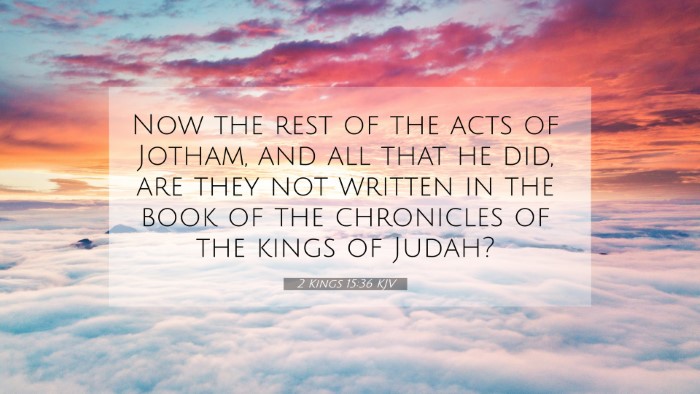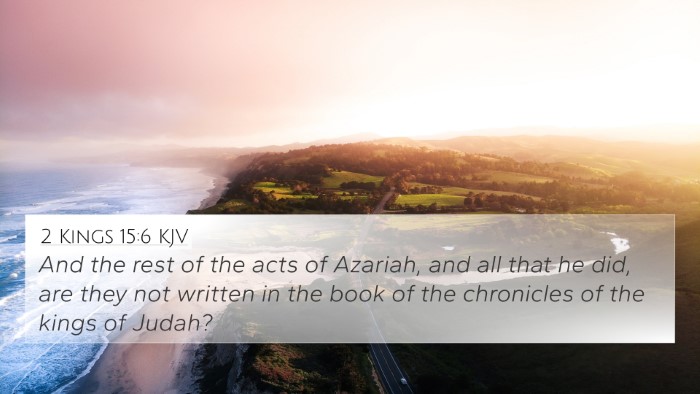Understanding 2 Kings 15:36
2 Kings 15:36 reads: "Now the rest of the acts of Jotham, and all that he did, are they not written in the book of the chronicles of the kings of Judah?" This verse serves as a transitional statement in the narrative of the kings of Judah, specifically relating to King Jotham.
Summary of Key Themes
- Historical Record: This verse highlights the importance of maintaining a historical record of the kings and their deeds.
- Continuity of Governance: It reflects the ongoing nature of leadership and the chronicles that document the reigns of Israel's rulers.
- Divine Oversight: There's an implication of God's providence in the affairs of kings, as their deeds are observed and recorded.
Biblical Context
King Jotham was the son of Uzziah and ruled in Judah approximately during the 8th century BC. His reign was marked by a mix of religious reforms and challenges. The reference to the "book of the chronicles" indicates that there were official records that documented the history of Judah's kings and their actions.
Insight from Matthew Henry
Henry emphasizes the significance of keeping a record of royal acts, suggesting that it serves to provide future generations a framework for understanding the past. It implicates that no king ruled without being accountable for his governance.
Albert Barnes Analysis
Barnes notes that the documentation mentioned in this verse connects to both faith and history. He draws attention to the idea that God’s sovereign hand is evident in the reign of kings, and thus we should reflect on the moral and spiritual implications of their reigns as recorded.
Adam Clarke's Commentary
Clarke asserts that the chronicled acts exhibit God's sovereignty over nations, underscoring the reality that rulers are beholden to divine judgment. He emphasizes that understanding these records guides believers in recognizing the importance of righteous leadership.
Cross-References and Thematic Connections
2 Kings 15:36 is linked to various other scriptures that enhance our understanding of its significance:
- 2 Chronicles 27:1-9: Discusses the reign of Jotham and provides details about his governance.
- 2 Kings 15:1-7: Provides background on the context in which Jotham ruled.
- 2 Chronicles 26:16-21: Chronicles the end of King Uzziah's life, laying context for Jotham's rise.
- Isaiah 6:1: References the year of King Uzziah’s death, impacting Jotham’s rule.
- Amos 7:10-17: Highlights prophetic interactions during Jotham's reign, indicating God's displeasure.
- Micah 1:1: Connects the prophetic call during the time of Jotham to the divine narrative.
- Psalms 75:7: Affirms God’s role in appointing rulers, resonating with the themes presented in this verse.
Tools for Bible Cross-Referencing
Engaging with scripture effectively often requires cross-referencing. Here are some tools for Bible cross-referencing:
- Bible Concordance: A useful resource for finding specific words and phrases across the Bible.
- Bible Cross-Reference Guide: Assistance for studying relationships between verses.
- Bible Chain References: Helps to follow themes or ideas through a series of verses that connect thematically.
- Comprehensive Bible Cross-Reference Materials: Books and digital tools that systematically classify scripture connections.
Importance of Cross-Referencing
Cross-referencing verses allows us to:
- Identify connections between the Old and New Testaments.
- Draw parallels between different characters, events, and teachings in the Bible.
- Enhance sermon preparation with a deeper understanding of scriptural context.
Conclusion
2 Kings 15:36 beckons us to consider the broader narrative of biblical history and God's providence in the reign of kings. By exploring related verses and employing cross-referencing tools, we can deepen our understanding of Scripture, its themes, and divine governance throughout history.




